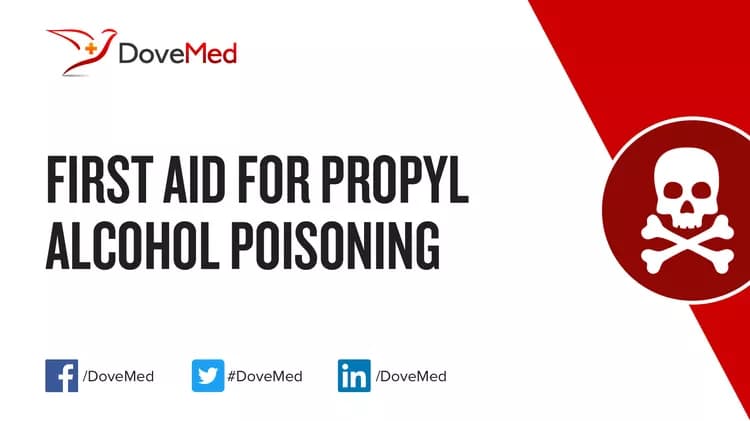What is Propyl Alcohol Poisoning?
- Propyl alcohol, or chemically 1-propanol, is a colorless alcohol (liquid) that is typically used as a solvent. It finds application in the printing, pharmaceutical, cosmetic, and polymer industry
- Propanol is sometimes used as rubbing alcohol, in nail polish removers, in hand wipes and hand sanitizer compounds, and in certain nebulizers
- Propyl Alcohol Poisoning is the accidental or intentional intake of any product containing the compound
- The condition is diagnosed based upon the clinical history, combination of signs and symptoms, and additional tests (that may include, in some cases, radiological studies and laboratory tests)
Propyl Alcohol Poisoning may be also referred to variously as the following:
- 1-Hydroxypropane Poisoning
- 1-Propanol Poisoning
- Ethylcarbinol Poisoning
- n-PrOH Poisoning
- n-Propanol Poisoning
- n-Propyl Alcohol Poisoning
- Propan-1-ol Poisoning
- Propionic Alcohol Poisoning
- Propionyl Alcohol Poisoning
- Propionylol Poisoning
- Propyl Alcohol Toxicity
- Propylic Alcohol Poisoning
- Propylol Poisoning
What are the Causes of Propyl Alcohol Poisoning?
- Propyl Alcohol Poisoning is caused by the ingestion/swallowing of propyl alcohol
- This intake could be accidental, or in some cases intentional, to bring self-harm
- Propyl alcohol compounds are low-to-minimally toxic in nature. However, ingestion of large quantities of the compound can result in associated symptoms
Note: The compound can interact with other prescribed or non-prescribed medications in the body. Such interactions may enhance the therapeutic effects of other medications being taken, resulting in undesired side effects.
What are the Signs and Symptoms of Propyl Alcohol Poisoning?
The signs and symptoms of Propyl Alcohol Poisoning can vary from one individual to another. It may be mild in some and severe in others. Several systems of the body may be affected. The poisoning may occur due to swallowing the compound, or rarely, due to breathing-in of propyl alcohol compound fumes and vapors.
The signs and symptoms of Propyl Alcohol Poisoning may include:
- Headache, fatigue
- Nausea, vomiting (blood in vomit sometimes)
- Stomach cramps and pain
- Breathing difficulties (including slow breathing)
- Unable to walk properly, lack of coordination
- Feeling dizzy, tired
- Low response level; low reflexes
- Urinary difficulties (reduced urine output)
- Reduced blood pressure (hypotension)
- Coma
How is First Aid administered for Propyl Alcohol Poisoning?
First Aid tips for Propyl Alcohol Poisoning:
- Call 911 or your local emergency help number, for emergency assistance
- Call the Poison Control Center at 1-800-222-1222 (or your local poison control center) for further instructions
- Provide them with information such as the compound taken, quantity and time of ingestion, age, weight and general health status of affected individual
- Confirm that the airways are protected; also, ensure breathing and the presence of pulse
- Administer CPR, if necessary
- Unless instructed by a healthcare professional, DO NOT induce vomiting in the affected individual
- Take individual to emergency room (ER) for further treatment
- Always try to take the compound bottle/container to the ER
The emergency medical health professional might perform the following steps towards treating the condition:
- Gastric lavage for elimination of drug from the stomach (irrigation using special solutions)
- Medically manage symptoms and provide breathing support, if necessary
- Administer activated charcoal to avoid absorbance of the substance in the body
- Administer laxatives for elimination of the compound from the body
- Administer fluids by an intravenous drip line
- In case the kidneys are affected, urinary dialysis may be necessary
Who should administer First Aid for Propyl Alcohol Poisoning?
First aid for Propyl Alcohol Poisoning is administered by healthcare professionals.
- The individual who is affected, or someone near, should call 911 for emergency assistance (or the local emergency number)
- They should also call the poison control center at 1-800-222-1222 (or the local poison control center) and follow instructions
What is the Prognosis of Propyl Alcohol Poisoning?
- The prognosis of Propyl Alcohol Poisoning is dependent on the amount of substance consumed, time between consumption and treatment, severity of the symptoms, as well as general health status of the patient
- Severity of the poisoning and timely medical assistance are the key prognostic indicators. Generally, the prognosis of Propyl Alcohol Poisoning is good, since the compound is not very toxic
- However, if the kidneys are affected, it can lead to renal failure which may adversely affect the prognosis
In general, toxicities are common situations in the emergency departments. A majority of the cases are often not fatal, when appropriate treatment is given.
How can Propyl Alcohol Poisoning be Prevented?
Propyl Alcohol Poisoning can be prevented by:
- Keeping all poisons correctly labeled and in suitable storage locations
- Always following instructions for usage of any household products
- Keeping any poisonous/hazardous chemicals and other materials out of children’s reach
- Being aware of basic first aid steps in case of an emergency (such as inadvertent poisoning)
What are certain Crucial Steps to be followed?
- Call 911 (or your local emergency number) for emergency assistance, if symptoms are life-threatening
- Call Poison Control Center at 1-800-222-1222 (or the local poison control center) and follow the recommend steps
- It would be helpful if the following information is readily available:
- Type, amount and time of consumption of the substance
- Age and weight of the individual
- And, the overall health status of the individual
Related Articles
Test Your Knowledge
Asked by users
Related Centers
Related Specialties
Related Physicians
Related Procedures
Related Resources
Join DoveHubs
and connect with fellow professionals


0 Comments
Please log in to post a comment.